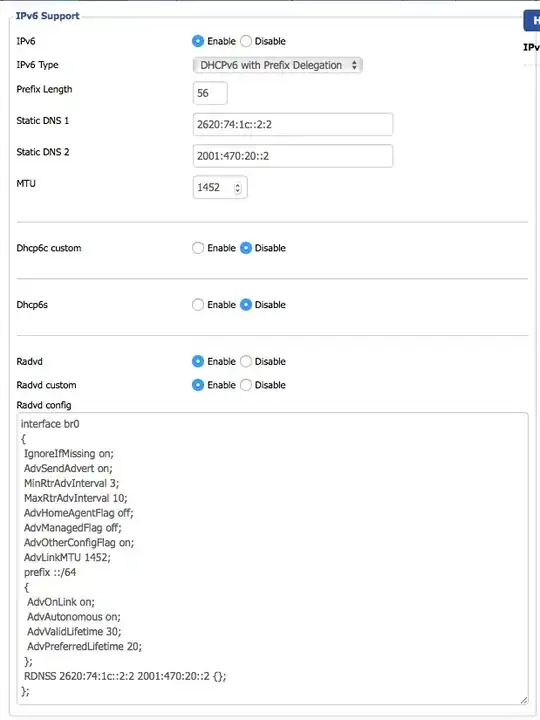I've a Debian 9 server with multiple network interfaces acting as web server connected to an ISP-provided optical network terminal (ONT) @ 1Gbps. The ISP provides us with multiple dynamic IPv4 addresses and optional static addresses.
Currently we're using a single static IPv4 address set at \etc\network\interfaces as:
iface eth0 inet static
address 89.xxx.xxx.xxx
gateway 89.xxx.xxx.xxx
netmask 255.255.255.0
With IPv6 they are not proving static options yet and they dynamically assign IPv6 blocks via prefix delegation using DHCP. The prefix length is /56 .
How can get one single IPv6 address on the network interface? I believe the server has to request a block and then assign the first IP to itself (or some random IP).
I've tried a simple config \etc\network\interfaces as:
iface eth0 inet6 dhcp
request_prefix 1
accept_ra 2
/etc/sysctl.conf with:
net.ipv6.conf.default.disable_ipv6=0
net.ipv6.conf.default.autoconf=1
net.ipv6.conf.default.accept_ra=2
net.ipv6.conf.all.disable_ipv6=0
net.ipv6.conf.all.autoconf=1
net.ipv6.conf.all.accept_ra=2
net.ipv6.conf.eth0.disable_ipv6=0
net.ipv6.conf.eth0.autoconf=1
net.ipv6.conf.eth0.accept_ra=2
But it didn't work, I just got a local link IPv6. Then I tried wide-dhcpv6:
interface eth0{
send ia-na 0;
send rapid-commit;
request domain-name-servers;
script "/etc/wide-dhcpv6/dhcp6c-script";
};
id-assoc na 0 {
};
Still only getting local link. From my understanding id-assoc na 0 would request an IPv6... however how this works since the ISP only provides everything as /56 block?
I also tried this without any luck:
interface eth0 {
send ia-na 0;
send ia-pd 0;
send rapid-commit;
request domain-name-servers;
script "/etc/wide-dhcpv6/dhcp6c-script";
};
id-assoc na 0 {
};
id-assoc pd 0 {
prefix ::/56 infinity;
prefix-interface eth0 {
sla-len 8;
sla-id 0;
ifid 1;
};
};
My final questions:
- What should
\etc\network\interfaceslook like when usingwide-dhcpv6? - Is any of my
wide-dhcpv6configurations correct? - It is possible to get the IPv6 without
wide-dhcpv6, using just the Debian dhcp client? - ISP uses
rapid-commithow can I enable that in\etc\network\interfaces?
Note: one of my colleagues was under the impression that IPv6 was just not working, so we tried to connect a DD-WRT router to the ISP and we set its settings as:
After a reboot we got IPv6 on the router and on the computers connect to it, so the issue must be with the configuration of our Debian server.

